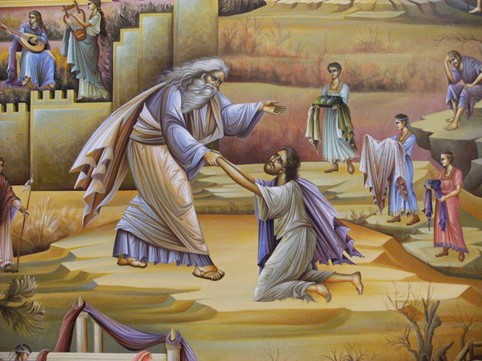
"For the completion of the remainder of our lives … in repentance…"
One of the most important petitions that are addressed to God during the Divine Liturgy (and in all other holy Services), is for repentance and forgiveness of our sins. These prayers of the Church are modeled on the prayer the Lord Himself gave us: “Our Father … and forgive our trespasses” (Matthew 6:9&12). What is being asked for here is to be freed from our sins. Other examples of this are beautifully expressed in Psalm 50 (51), which is recited at least four times a day, along with such prayers and supplications as: “For the completion of the remainder of our lives in peace and repentance, let us ask the Lord”; “We also pray for …the forgiveness and the remission of sins …” We also have the period of Triodion and Holy Great Lent, which includes the hymn “Oh You Giver of life, open up the gates of repentance …” The chanting of this hymn, following Psalm 50 (51) during Sunday Matins, calls our souls to repentance.
These prayers for repentance are made frequently in our public worship. And yet, many of us remain hesitant, not realizing what a blessing it is. What ends up happening, is a person hears the word “repentance,” and they are overcome with fear and shame. Their thoughts go to all of the bad things they have done in their life, and the idea of going to their Spiritual Father to confess them is more than they can bear.
The truth is, repentance and confession are not shameful acts at all! The shame comes from committing the sin, not in being cleansed of it. When someone repents, and confesses their sins, they can rejoice, because they are cured from the diseases of their soul. The stench of sin is removed, and they are given the courage to raise their eyes to God, with a clean conscience.
Our contemporary Saint Porphyrios used to say: “Repentance is the Mystery of God’s love for man. In this perfect way, man gets rid of that which is evil. We go to confession and feel reconciled with God; we feel joy inside, and guilt departs. We approach immortality with no anxiety, and with no fear. In Orthodoxy there is no dead-end, because there is a confessor who has received the grace to offer forgiveness” (Life and Words, p. 400). In other words, a sinner realizes their weakness and with repentance takes refuge in God the Father’s compassion, like the Prodigal Son of today’s Gospel reading. With confession, there is peace and inexplicable joy.
The question then becomes: If repentance is something that can easily be done, why are there people who still refuse to repent, carrying the burden of their sins?
The Holy Fathers of the Church teach that Repentance has two necessarily elements: The free will of humanity and God’s action. A person cannot repent alone, as the Lord Himself said, “Without Me you can do nothing” (John 15:5). God’s grace is necessary for this great good to be awakened within each person. We realize the sad situation we are in, and in this way we are stirred to repentance. As St. Paul the Apostle writes, “it is God who works in you both, to will and to do what is in accordance with His redemptive plan” (see Philippians 2:13).
However, in order for Christ to come to us, our participation is essential. We need to approach Christ with humility, love, and prayer. Out of respect for our freedom, God waits for people to come to Him, of their own free will, to seek this healing. That is why in our communal worship (as well private prayers) we ask the Lord repeatedly, to grant us repentance “For the completion of the remainder of our lives in peace and repentance, let us ask the Lord”; and “Heavenly Father…receive us in a state of repentance and confession, as You are kind and man loving One”.
It is important for us to understand what these prayers mean. We should not limit repentance to those times we feel we should go to our Spiritual Father for confession. Repentance is not just a singular act, but an ongoing process. Since it is possible to sin at every moment of every day, we need to be in a constant state of repentance. In other words, sin is a deadly virus, and repentance is our vaccine. This vaccine is our lifelong protection against spiritual decay and death, which separates the soul from God, the source of life.
With this preparation of the soul through repentance and confession, the Christian can enjoy the supreme gift of God, which is the precious Body and Blood of Christ in Holy Communion, “for joy, health and delight”, and “for the remission of sins and life everlasting”.
May we, my brothers and sisters, become conscious of the significance of the penitential prayers in our worship, especially in the Divine Liturgy. We must stay vigilant, so that these prayers and supplications penetrate our hearts on their way to Heaven. Our Lord, in His love for humanity, will shed His Grace upon us, enabling a constant state of repentance. In this way, we can always enjoy gladness and peace, both here and in eternal life. Amen.





